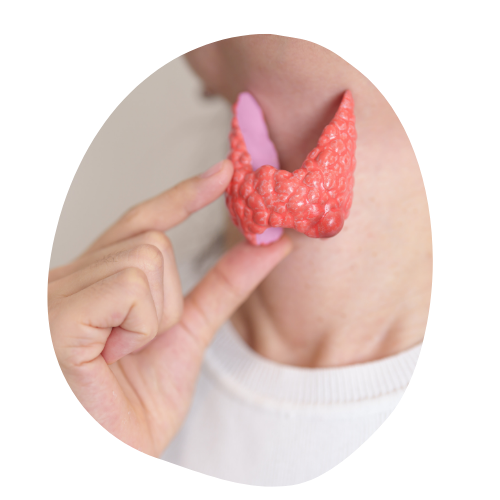Thyroid Balance
Thyroid Balance, Beyond Fertility
20 MINUTE READ
Published July 2024
AUTHOR
Megan Lyons
Contributing Editor, Doctor of Clinical Nutrition (cand), Board Certified Clinical and Holistic Nutritionist
Whether you have struggled with fertility or not - reading this guide is a must! Discover how maintaining thyroid health can boost energy, improve mood, and regulate metabolism. This guide will help unpack what the thyroid does, why it matters, and how you can positively influence your thyroid health through diet and lifestyle factors (no matter what your diagnosis!).
When it comes to maintaining a healthy thyroid, diet and nutrition play a crucial role. The thyroid gland relies on a variety of nutrients to function optimally, including a wide variety of antioxidants and phytonutrients including selenium, zinc, and vitamins A, D, and E. A well-balanced diet that provides these essential nutrients can support the production and regulation of thyroid hormones. Additionally, certain dietary patterns and foods can help reduce inflammation and support immune function, both of which are vital for individuals with thyroid conditions like hypothyroidism and Hashimoto's thyroiditis. By understanding and implementing specific dietary strategies, you can positively influence your thyroid health, manage symptoms more effectively, and improve your overall well-being.
This primer aims to shed light on common thyroid issues, explaining what they are, how they affect your body, and what steps you can take to manage and improve your thyroid health. Whether you're dealing with symptoms or simply looking to support your thyroid naturally, understanding this vital gland is the first step toward restoring your vitality and metabolism.
So what is the thyroid gland exactly…
Your thyroid is a small butterfly-shaped gland located at the base of your neck. It plays a crucial role in many bodily functions, including regulating metabolism, energy levels, and overall health. Thyroid imbalances can cause you to feel overly tired/fatigued, have difficulty losing or gaining weight, and/or cause brain fog/difficulty concentrating.
Beyond these major life disturbances, thyroid imbalances can lead to more serious and damaging conditions like hypothyroidism (low thyroid function) and Hashimoto's Thyroiditis (an autoimmune condition where your body inadvertently starts destroying your thyroid gland and causes low thyroid function). While the linkage between fertility and thyroid dysfunction is complex, a few specific manifestations include decreased ovarian reserve in hypothyroid patients and the prevalence of co-existing conditions like PCOS and endometriosis, both of which impact reproduction. The research clearly documents a higher incidence of hypothyroidism in those seeking fertility treatments, and restoring thyroid health can be an important piece of the fertility puzzle.
Breaking it down further
The thyroid gland is a crucial component of the endocrine system, responsible for producing hormones that regulate metabolism, energy production, and the function of virtually every organ system in the body. Keeping these hormones in “balance” is essential to maintaining (or regaining) optimal fertility, getting the body composition changes you are seeking, and looking and feeling youthful.
In adults, our thyroid hormones, primarily thyroxine (T4) and triiodothyronine (T3), play a vital role in:
Controlling the body's metabolic rate, which influences how quickly the body uses energy and burns calories. Suboptimal metabolic rate can lead to weight retention, blood sugar dysregulation, physical fatigue, brain fog, and mood dysregulation.
Regulating reproductive health and fertility by influencing menstrual cycles, ovulation, and hormone balance, which are essential for conception and maintaining a healthy pregnancy
Contributing to the health of hair, skin, and nails, contributing to their growth, texture, and strength
Regulating body temperature by influencing how much heat the body produces, thereby ensuring proper thermoregulation
Supporting cardiovascular health by influencing heart rate and blood pressure, which are critical for maintaining proper circulation and cardiovascular function
Promoting mental clarity and cognitive function by supporting neurotransmitter activity in the brain, which affects focus, memory, and overall mental well-being
Maintaining muscle function and strength by influencing protein synthesis and energy production in muscle tissues, which are essential for physical performance and recovery.
In children, thyroid hormones are essential for proper growth and development including:
Ensuring proper brain development, particularly during fetal development and infancy.
Supporting bone health by regulating bone turnover and mineralization processes, crucial for maintaining skeletal integrity and preventing conditions like osteoporosis.
Supporting overall physical growth by regulating growth hormone activity and ensuring that children reach their full height potential during their growth spurts.
Developing and maintaining muscle strength and coordination, which are vital for motor skills and physical activities.
Ensuring a healthy metabolism, which supports energy levels and nutrient absorption necessary for growth and development.
Supporting the maturation of the nervous system, which is crucial for cognitive development, learning abilities, and emotional regulation.
Influencing the development of the reproductive system, ensuring proper puberty onset and overall reproductive health.
These diverse functions highlight the thyroid gland's importance in maintaining optimal health and well-being.
How the thyroid gland works
The production and regulation of thyroid hormones involve a complex interplay between the thyroid gland and the brain (specifically, 2 parts of the brain called the pituitary gland and the hypothalamus). When the body requires more thyroid hormones, the hypothalamus secretes thyrotropin-releasing hormone (TRH), which stimulates the pituitary gland to release thyroid-stimulating hormone (TSH). TSH then signals the thyroid gland to produce and release thyroxine (T4), which is converted by the body into the usable form, triiodothyronine (T3) and released into the bloodstream. T3 in particular is what has the biggest impact on various tissues, organs, and systems throughout the body, influencing metabolism, growth, and development. Feedback mechanisms are in place to ensure that thyroid hormone levels remain within a narrow range to maintain optimal physiological function, but as we will discuss below, several things can lead to these feedback mechanisms going awry.
Common thyroid issues
Common symptoms of thyroid dysfunction can include fatigue, weight changes, mood fluctuations, and temperature sensitivity. Hypothyroidism (low thyroid hormone in the body) is generally felt as slow - slow thinking (brain fog), slow digestion (constipation), slow metabolism (weight gain), slow mood (depression), slow energy (fatigue), while hyperthyroidism (high thyroid hormone in the body) generally results in the opposite (diarrhea, excessive nervous energy and anxiety, insomnia). In women, thyroid imbalances frequently intersect with fertility problems, affecting menstrual cycles and ovulation. Specifically, the second half of the cycle (luteal phase) is impacted, making a pregnancy less likely.
-
Hypothyroidism is the most common thyroid condition today. Hypothyroidism occurs when the thyroid gland fails to produce sufficient thyroid hormones to meet the body's needs. This can lead to a variety of symptoms, including fatigue, weight gain, constipation, dry skin, hair loss, and feeling cold all the time. While iodine deficiency used to be a common cause of hypothyroidism, particularly in regions with low dietary iodine intake, autoimmune conditions such as Hashimoto's Thyroiditis are now the leading cause in developed countries. Treatment typically involves thyroid hormone replacement therapy to restore hormone levels to normal, but there are several dietary and lifestyle interventions that can be just as effective as thyroid medication (or in addition to thyroid medication if warranted).
-
Hashimoto's Thyroiditis is a major reason people have hypothyroidism. Hashimoto’s is an autoimmune disorder in which the body's immune system mistakenly attacks the thyroid gland, leading to inflammation and eventual destruction of thyroid tissue. This autoimmune attack results in decreased production of thyroid hormones, leading to hypothyroidism. While genetics play a role in the development of Hashimoto's, environmental factors such as gluten consumption, chronic stress, and gut health also play significant roles. Adopting a gluten-free diet, managing stress effectively, and reducing inflammation throughout the body through lifestyle modifications and targeted interventions are essential for managing Hashimoto's and supporting thyroid health. Hashimoto’s is more common than you might think, particularly among women. In fact, as diagnosis and awareness improve, research indicates that the prevalence of Hashimoto’s is up to 26% of people in various parts of the world (for American women specifically, estimates range from 5% - 20%). Women are 4-10 times as likely as men to have Hashimoto’s.
-
Note that hyperthyroidism, or an overactive thyroid, also occurs. The autoimmune version of this is called Graves’ disease. Because of their lower prevalence, we will put less focus on these conditions in this guide, but our team of experts is available and ready to help with these diagnoses!
If you suspect you may have thyroid dysfunction, it’s a good idea to get checked. You may have had a TSH (thyroid stimulating hormone) test checked during an annual physical, but that’s not enough to determine a well-functioning thyroid. We recommend getting TSH, T3, T4, free T4, free T3, reverse T3, and thyroid antibodies (TG and TPO) to diagnose conditions like hypothyroidism and Hashimoto’s thyroiditis. These tests provide crucial insights into how well your thyroid is functioning and whether an autoimmune component is present. Remember, our experts are here to help guide you through the process of diagnosis and management, offering personalized support to optimize your thyroid health and overall well-being. When you work with our functional nutritionists, they can walk you through lab tests, place orders for you, and guide you through management strategies.
Why it matters
Thyroid imbalances can wreak havoc on the body, affecting virtually every aspect of health and well-being. When thyroid hormone levels are suboptimal, a wide range of symptoms may manifest, signaling potential dysfunction within the thyroid gland. One reason people think almost everything is caused by thyroid dysfunction is because, well, almost everything can be caused by thyroid dysfunction!
If you have a few of these symptoms and they are persistent (not just “I felt moody yesterday,” but rather “I’ve felt moody for 3 months”), it’s a great idea to get a full panel run. You can ask your practitioner for the full thyroid panel mentioned above, and our team of functional nutritionists is here to help, if you need additional support.
-
Persistent feelings of tiredness, despite adequate rest and sleep, are a hallmark symptom of thyroid dysfunction.
-
Unexplained weight gain or difficulty losing weight, as well as unexplained weight loss in cases of hyperthyroidism, may indicate thyroid issues.
-
Intolerance to cold temperatures or feeling excessively hot and sweaty can be indicative of thyroid dysfunction affecting thermoregulation.
-
Constipation is a common symptom of hypothyroidism, while diarrhea may occur in cases of hyperthyroidism.
-
Dry, brittle hair; dry, rough skin; and brittle nails that break easily are often associated with thyroid imbalances.
-
Mood disturbances, including depression, anxiety, irritability, and mood swings, may occur as a result of thyroid dysfunction.
-
Cognitive symptoms such as difficulty concentrating, memory problems, and mental fog are common in thyroid disorders.
-
Irregular menstrual cycles, heavy or prolonged periods, or fertility issues may indicate thyroid dysfunction in women.
-
Weakness, stiffness, and muscle aches or pains can result from thyroid imbalances affecting muscle and joint function.

What the research says
Left untreated, thyroid imbalances can have serious consequences for long-term health. Prolonged hypothyroidism or hyperthyroidism can lead to a range of complications, including:
Cardiovascular Issues: Thyroid dysfunction can increase the risk of heart disease, high blood pressure, and elevated cholesterol levels.
Metabolic Disorders: Uncontrolled thyroid imbalances can contribute to metabolic syndrome, insulin resistance, and dyslipidemia.
Bone Health: Chronic thyroid dysfunction can lead to decreased bone density and an increased risk of osteoporosis and fractures.
Neurological Complications: Thyroid imbalances may affect neurological function, leading to neuropathy, cognitive decline, and dementia.
Reproductive Problems: Thyroid dysfunction can disrupt reproductive hormones, leading to menstrual irregularities, infertility, and pregnancy complications.
Strategies you can use to support thyroid health
While this all sounds scary, the good news is that the sooner we catch thyroid issues, the better we are at reversing them! Recognizing the signs of thyroid imbalances and taking proactive steps to address them can lead to improved vitality, energy, and overall well-being. With the right support and treatment, it's possible to regain thyroid balance and feel like yourself again!!
Diet and nutrition play a pivotal role in supporting thyroid health, particularly for individuals managing conditions like Hashimoto's or hypothyroidism. Here are several strategies we recommend:
Adopting an anti-inflammatory diet rich in whole, unprocessed foods can significantly improve thyroid function and reduce autoimmune reactions. Our thyroid gland loves micronnutrients (vitamins and minerals, primarily from vegetables and fruits) as well as a healthy macronutrient balance (see our Fueling Your Body guide for more!), so ensuring you are well nourished will support thyroid function.
Consuming high amounts of nutrient-dense foods such as leafy greens, cruciferous vegetables (lightly cooked to reduce goitrogens), lean proteins, and healthy fats from sources like avocados and nuts.
Eliminating gluten, dairy, and soy, which are common triggers of inflammation and autoimmune flare-ups. These all cause inflammation in the body, and often cause higher inflammation for those with autoimmune conditions because of an underlying leaky gut. Reducing or eliminating them helps the immune system rebalance and not be overzealous, which leads to autoimmunity.
Balancing thyroid-specific nutrients. Selenium and zinc are critical nutrients for thyroid health, as they support the production and conversion of thyroid hormones. Foods rich in selenium, like Brazil nuts and seafood, and zinc-rich foods, like oysters, pumpkin seeds, lentils, and beef. Iodine is a tricky nutrient for thyroid health. In people without Hashimoto’s, intaking a small amount of iodine is helpful, and including foods like seaweed, cod, dairy, and eggs can be thyroid supportive. However, in those with Hashimoto’s, iodine should be limited. See our resources for more on iodine and thyroid.
Incorporating anti-inflammatory foods such as turmeric, ginger, and fatty fish can help manage chronic inflammation associated with autoimmune thyroid conditions.
Increasing intake of probiotics and a consuming a diet high in fiber can promote a healthy microbiome, reducing inflammation and supporting nutrient absorption.
Managing Hashimoto's or hypothyroidism extends beyond diet to encompass a holistic lifestyle approach. Stress management is crucial, as chronic stress can exacerbate thyroid dysfunction by disrupting the hypothalamic-pituitary-thyroid (HPT) axis and increasing cortisol levels. Techniques such as mindfulness meditation, yoga, and regular physical activity can help lower stress and improve overall well-being. Adequate sleep is essential for hormone regulation and immune function, so establishing a regular sleep routine is beneficial. Supporting gut health is also vital, given the strong connection between the gut and immune system. Regular monitoring of thyroid levels through blood tests, as well as working with a healthcare provider to tailor treatment and dietary strategies, can empower individuals to effectively manage their thyroid condition and improve their quality of life.
What supporting a healthy thyroid might look like
Supporting general thyroid health
-
Consume selenium-rich foods (we recommend 1 Brazil nut per day(or taking a Selenium supplement if Brazil nuts are not preferred / available.
Incorporate zinc sources (e.g., pumpkin seeds, legumes, almonds, meat) a few times per week
Include omega-3 fatty acids (e.g., fatty fish walnuts, avocado, flaxseeds) once per day or more
Limit processed foods and refined sugars(see our “Balancing Extras” primer for more!)
Maintain balanced nutrition with plenty of fruits, vegetables, and whole grains
-
Cultivate stress-relief methods like deep breathing and journaling which support lower levels of stress .
Engage in enjoyable movement
Prioritize quality sleep and downtime
Work towards lowering toxins in your living environment. Deodorant, personal care products, cleaning products, and laundry detergent are common culprits. See the resources below for more on how to trade toxins out of your home.
-
As mentioned, we recommend ensuring adequate selenium intake by eating one Brazil nut per day (or taking a Selenium supplement)
Ensuring Vitamin D levels are optimal via sunlight or supplementation is essential for thyroid health
Probiotics and other gut-supportive supplements also indirectly support the thyroid
If you are newer to your health journey and are not yet getting in the nutrients you need from food, a multivitamin and minerals are a great addition
-
Working with a Triplemoon nutrition expert can help you to assess your actual thyroid function beyond the symptoms. Consider working with your Triplemoon nutritionist and/or your primary care physician to evaluate the following:
Routine thyroid function tests (TSH, T4, T3)
If you suspect dysfunction, also include free T3, free T4, reverse T3, and thyroid antibodies (anti-TG and anti-TPO)
Vitamin D status assessment
Complete blood count (CBC)
Comprehensive metabolic panel (CMP)
Inflammatory markers (e.g.,hs-CRP)
Supporting hypothyroidism or Hashimoto’s
-
Do all of the interventions to the left
Consider an anti-inflammatory diet that is rich in vegetables, fruits, lean proteins, and healthy fat, and low in refined and ultra processed food. This type of diet is supportive of remission from Hashimoto’s and improved thyroid levels in hypothyroidism.
Fiber from vegetables also supports reducing heavy metals and toxins in the body. Cilantro is particularly good at this, so load up if you enjoy it!
Additionally, we recommend adopting a gluten-free diet, which has been shown to significantly improve chances of putting Hashimoto’s into remission
Alcohol is particularly detrimental with Hashimoto’s, so use sparingly
In Hashimoto’s, we want to limit excessive iodine intake to less than 100mcg per day, so watch out for iodized salt, seaweed, dairy, and dietary supplements that may contain iodine
-
In the healing phase of Hashimoto’s, exercise follows the “Goldilocks effect:” too little is not optimal, and too much is not optimal. Aiming for 30 minutes per day is an ideal spot.
Consider more aggressively switching from toxic home products and personal hygiene products to cleaner alternatives. The US currently allows companies to include known carcinogens and substances that can harm fetal and infant development in their products, so it can be tough to sleuth out the best options. A great start is to scan the ingredients for “fragrance” or “parfum” and eliminate those items, and to look for paraben-free and phthalate-free products.See the resources below for more on how to trade toxins out of your home. If you think you’ve had significant exposure, consider working with a practitioner to get tested and support your body in removing these.
-
Consider all of the supplements to the left.
In addition, consider myo-inositol, which has shown benefit for thyroid health via impacting hormone signaling and oxidative stress.
Consider glutathione, often called the master antioxidant, for detox support. Check with your practitioner before using glutathione if breastfeeding.
A B complex may be supportive in restoring energy levels if your levels are low.
-
All of the tests at left, especially testing antibodies at minimum every year
About the author
Megan Lyons
Owner of Lyons’ Share Wellness, Double Board Certified as a Clinical Nutritionist and Holistic Nutritionist & Doctorate of Clinical Nutrition (Cand)
As owner of her own wellness business, Megan has completed over 12,000 hours of 1-to-1 nutrition consulting, spoken on hundreds of stages, and reached hundreds of thousands through her…
Nutritionists
•
Adult mental health
•
Couples mental health
•
Infant & child mental health
•
Sleep coaching
•
Nutritionists • Adult mental health • Couples mental health • Infant & child mental health • Sleep coaching •
When to get
expert support
If you think you need expert support, this is a great reason to pop into office hours. Sometimes you might need more support, and that's okay!
If your practitioner brushes off your symptoms or will not run a full thyroid panel because your TSH is “fine” (Our team of functional nutrition experts can support you in ordering labs as needed, and other functional medicine practitioners are likely to support the idea as well!)
If you notice excessive hair loss or extreme temperature dysregulation in conjunction with the symptoms mentioned above
Before going on thyroid medication or other supplements claiming to be quick fixes for the thyroid
Have a question for your coach?
Schedule time during their weekly office hours! We know not all questions come up on a schedule, which is why your coach is also available outside of the sessions included in your Learning Program.
-
Hu, X., Chen, Y., Shen, Y., Tian, R., Sheng, Y., & Que, H. (2022, October 13). Global prevalence and epidemiological trends of Hashimoto’s thyroiditis in adults: A systematic review and meta-analysis. Frontiers in public health. https://www.ncbi.nlm.nih.gov/pmc/articles/PMC9608544/
Gluvic, Z. M., Zafirovic, S. S., Obradovic, M. M., Sudar-Milovanovic, E. M., Rizzo, M., & Isenovic, E. R. (2022, July 27). Hypothyroidism and risk of cardiovascular disease. Current pharmaceutical design. https://pubmed.ncbi.nlm.nih.gov/35726428/
Wieland, D. R., Wieland, J. R., Wang, H., Chen, Y.-H., Lin, C.-H., Wang, J.-J., & Weng, C.-H. (2022, August 16). Thyroid disorders and dementia risk: A nationwide population-based case-control study. Neurology. https://pubmed.ncbi.nlm.nih.gov/35794019/
Danailova, Y., Velikova, T., Nikolaev, G., Mitova, Z., Shinkov, A., Gagov, H., & Konakchieva, R. (2022, May 5). Nutritional management of thyroiditis of Hashimoto. International journal of molecular sciences. https://www.ncbi.nlm.nih.gov/pmc/articles/PMC9101513/
Concepción-Zavaleta, M. J., Coronado-Arroyo, J. C., Quiroz-Aldave, J. E., Concepción-Urteaga, L. A., & Paz-Ibarra, J. (2023, November). Thyroid dysfunction and female infertility. A comprehensive review. Diabetes & metabolic syndrome. https://pubmed.ncbi.nlm.nih.gov/37866272/








